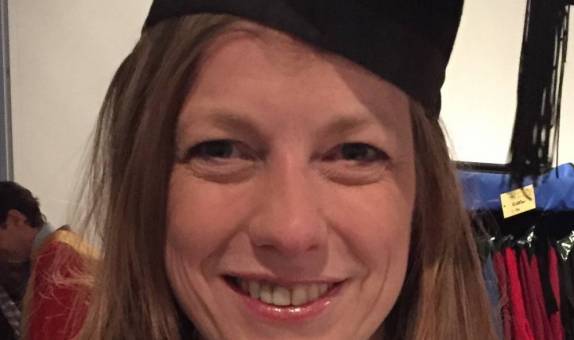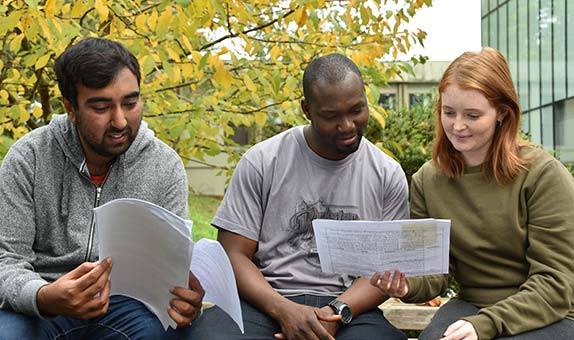Creative Writing and Publishing MA
Why choose this course?
This course examines not only the craft of writing, but also how the publishing industry works. You will develop a creative writing portfolio alongside studying trends in the industry.
The creative writing element of this course is workshop-led, with opportunity to specialise in the genre of your choice. The publishing element focuses on marketing-led commercial and trade publishing, industry structure and core skills.
For your final assessment, you may choose a creative writing dissertation, a publishing dissertation or undertake a practical publishing project.
| Mode | Duration | Start date |
|---|---|---|
| Full time | 1 year |
September 2024 September 2025 |
| Full time | 2 years including professional placement |
September 2024 September 2025 |
| Part time | 2 years |
September 2024 September 2025 |
| Main Location | Penrhyn Road |
Curtis Brown Agent's Choice competition
All successful applicants who take up their place with us in September will be entered into our competition to have a consultation with Annabel White, an agent at top London literary agency Curtis Brown.
So make sure the creative work you submit with your application is your very best - it might win you a meeting with a literary agent.
Reasons to choose Kingston University
- Kingston's Publishing and Creative Writing teaching teams have relationships with all the leading fiction publishers and literary agents in the UK.
- You will have the opportunity to contribute to Kingston University's publication, Ripple, which includes fiction, poetry, reviews and creative non-fiction, and is edited by students on the course.
- You will become part of Kingston's thriving community, with events such as readings, lectures from published authors, editors and agents, masterclasses and enriching discussions.
The Art School Experience
As part of Kingston School of Art, students on this course benefit from joining a creative community where collaborative working and critical practice are encouraged.
Our workshops and studios are open to all disciplines, enabling students and staff to work together, share ideas and explore multi-disciplinary making.

What you will study
The creative writing element of this course is workshop-led. In the second semester, you will be given the opportunity to specialise in the genre of your choice, be it poetry, drama or children's fiction.
The publishing element focuses on marketing-led commercial and trade publishing. The modules you study will help you to understand the structure of the industry and the core skills required to enter.
You'll take two 30-credit modules from Publishing (one must be 'Create' but you can choose the other, and two 30-credit modules from Creative Writing. You can then choose whether to pursue a dissertation or practical project within either Publishing or Creative Writing, worth 60 credits.
Modules
Optional placement year
In addition to taking two core modules, you can choose to write an academic dissertation to demonstrate your analytical skills and competence, or undertake a major practical publishing project as your final assessment. If you choose to take your dissertation in creative writing, you will write an extensive piece of creative writing accompanied by critical essay; you will be supervised by a professional writer.
Core module
Create: The Business of Publishing
30 credits
This module initiates you into the collaborative, creative business of commercial publishing and facilitates the development of your research, critical thinking and entrepreneurial skills. From books and magazines to apps and websites, you will explore the structure and operation of successful publishing companies, the stakeholders, tools and processes crucial to the development of profitable multi-platform products and services and the fundamental and disruptive business models used by both traditional companies and new industry-entrants.
After an immersive introduction to the complex and challenging nature of 21st century publishing, the module offers the opportunity for the generation and critical evaluation of your own publishing ideas. This involves using industry-standard sources and approaches to research and analyse markets, identify appropriate business models and operational strategies and build and present persuasive business cases.
Throughout, there is an emphasis on building robust and well-evidenced arguments to win support for theoretical assertions and practical publishing concepts. You also have the opportunity to work with your peers, and to critically evaluate each other's publishing proposals.
Optional modules
Share: Strategic Marketing and Sales
30 credits
This module considers the various individuals and communities (colleagues, shareholders, retailers, distributors, customers and other stakeholders) involved in the business of content delivery, and how most effectively to disseminate information and influence their behaviour, in order to promote effective marketing and sales.
This module will enable students to understand the principles of marketing and sales, and develop associated skills in applying them to meet the demands of modern publishing. Students will undertake exercises and discussions about the various applications of sales and marketing within the publishing industry and consider their relevance through all stages of the publishing process.
Through this process students will learn how best to investigate the market for demand, how to predict that demand, and how to prepare, market and distribute information about a product or service, whether in whole or part, to promote profitable fulfilment of that demand.
Publishers operate in an international context and so must market and sell their products to customers around the globe. Students will therefore consider how publishers organise themselves to deliver international operations successfully, and explore associated cultural, pricing and communication issues.
Make: Content Development and Production
30 credits
This hands-on module gives students the key theory and the core practical skills needed to effectively manage content from raw material to finished print and digital presentation. Working in teams, students will carry out essential editorial and production tasks to produce a live published product. This group publication project enables students to collaborate to demonstrate the teamwork skills required for timely delivery, and to develop a thorough understanding of workflow and the associated processes. It also enables students to show how material gets turned into a market-appropriate product, ready for stakeholder approval and launch. The module enables students to illustrate how value gets added within the publishing supply chain, and to appreciate the content management systems and metadata vital in today's publishing environment.
By working on in-class exercises and assignment projects students will acquire and apply the key skills necessary to operate within a professional publishing context. Students will engage with project management, budgeting and costing, briefing, the different types of editing, design and layout, proofreading, and delivery. This module enhances employability by allowing students to use industry standard tools and packages, such as HTML, InDesign and Photoshop, and to improve understanding of basic typographic and design principles, the application of typesetting/mark-up skills, and production of publication ready files. Practising these hands-on skills will enhance students' understanding of how attention to detail can improve a product, make it the best it can be, and ensure it is presented profitably to its intended market.
Writers' Workshop
30 credits
In this module you will present and discuss your own and each other's work in a weekly workshop. The draft work presented may include several genres and forms, such as crime writing, fantasy fiction, children's literature, historical fiction, science fiction, romance and autobiography. Practical criticism of student writing will be accompanied by discussion of the scope or constraints of the various genres, as well as the implications of particular forms. Attention will be paid to the transferable components of good writing: appropriate use of language, narrative pace, dialogue, expression, characterisation and mood.
Ten Critical Challenges for Creative Writers
30 credits
The module is designed to introduce students to some issues of critical and literary theory. The module is also designed to make students more aware of how their work impacts upon wider literary, cultural, political and philosophical issues. Awareness of these theories and of some of the issues surrounding the production and reception of literary texts will stimulate them, encouraging creative and conceptual thinking. The module will explore debates about literature and the practice of creative writing through readings of essays and texts that are relevant to criticism and theory. The academic component of the assessment will support the creative work with the objective that students will also have to demonstrate critical, academic, analytical skills.
Writing the Contemporary
30 credits
This module provides the opportunity to examine ways in which reading is essential to writing practice and teaches you to apply literary techniques and strategies from contemporary fiction, life writing and poetry texts to your own work. You will develop the concept of 'reading as a writer' in order to explore how contemporary concerns are brought to the fore by artistic strategies, and examine how an understanding of these can provide models for your own creative practice. You will submit work including a reflective reading journal as well as a creative piece in a genre of your choice.
Special Study: Workshop in Popular Genre Writing
30 credits
This module offers a regular and intensive review of your writing in one of the following genres: poetry, crime writing, prose fiction, biography, drama, scriptwriting or writing for children. You will be advised on how to strengthen your knowledge of the codes and conventions of your chosen genre to produce a substantial piece or collection of work that will reflect your knowledge of and engagement with your chosen genre. You will apply detailed feedback on your work to your writing as well as using your increased knowledge of your chosen genre to make your writing more effective. These elements will help you improve the key transferable skills of analysis and implementation that will feed forward into your dissertation module and into all analytical/practical tasks you subsequently undertake.
Publishing Dissertation
60 credits
The Publishing dissertation module provides students with the opportunity to independently conceive, explore, investigate and then deliver a significant study within the publishing industry and allied fields. The theoretical underpinning may vary according to the approach taken and the research questions chosen, but the outcome should be a sustained and coherent piece of detailed work, capable of publication and wider dissemination.
Depending on the issue chosen, students will engage with a range of professionals within the industry, and within related fields. Although students are expected to take responsibility for their own learning, they are supported and mentored by an individual supervisor during the process.
Practical Publishing Project
60 credits
The Practical publishing project provides students with the opportunity to conceive, plan, manage and deliver a substantial publishing-related output in order to achieve specified goals. Examples of potential projects include producing and publishing a book, app or magazine, researching and presenting a start-up business plan or developing and implementing a major market research exercise. In all instances, students are expected to define a specific audience and relevant stakeholders, as well as personal development and project objectives. Students will also develop a structured project plan and a post-project critical evaluation, in order to identify personal goals for future professional development.
Depending on the nature of the chosen project, students will engage with different ranges of knowledge and skills, from practical print or digital production methods and processes to software expertise, market research (including questionnaire design, data analysis and interpretation) and business planning. Although students are expected to take responsibility for their own learning, they are supported and mentored by an individual supervisor at key points in the process.
Creative Writing Dissertation
60 credits
This module focuses on your own creative writing and research into your chosen form or genre, developed in consultation with your supervisor. You learn via one-to-one tutorials with your personal supervisor. You produce two pieces of writing:
- a creative dissertation – a portion of a novel, a body of poetry, a play screenplay or other creative form of no more than 15,000 words; and
- a critical essay of approximately 3,000 words – considering the relationships between your own writing and the literary contexts/theoretical concerns that inform published writing in your chosen genre or form.
Your supervisor must agree in advance the final structure, approximate word length and for presentation conventions of these pieces.
Many postgraduate courses at Kingston University allow students to do a 12-month work placement as part of their course. The responsibility for finding the work placement is with the student; we cannot guarantee the work placement, just the opportunity to undertake it. As the work placement is an assessed part of the course, it is covered by a student's Student Route visa.
Please note
Optional modules only run if there is enough demand. If we have an insufficient number of students interested in an optional module, that module will not be offered for this course.
Entry requirements
Teaching and assessment
You'll be taught and assessed through essays, reports, presentations, briefs, research projects and portfolios.
Postgraduate students may also contribute to the teaching of seminars under the supervision of the module leader.
Fees for this course
Additional costs
Depending on the programme of study, there may be extra costs that are not covered by tuition fees which students will need to consider when planning their studies. Tuition fees cover the cost of your teaching, assessment and operating University facilities such as the library, access to shared IT equipment and other support services. Accommodation and living costs are not included in our fees.
Where a course has additional expenses, we make every effort to highlight them. These may include optional field trips, materials (e.g. art, design, engineering), security checks such as DBS, uniforms, specialist clothing or professional memberships.
Facilities
The campus at Penrhyn Road is a hive of activity, housing our fantastic new Town House, with four floors of study space and our extensive library, the main student restaurant, and a host of teaching rooms and lecture theatres.
The Town House offers group study spaces for when you need to work together. The light, airy top floor cafe serves light snacks and drinks, as well as fabulous views!
At the heart of the campus is the John Galsworthy building, a six-storey complex that brings together lecture theatres, flexible teaching space and information technology suites around a landscaped courtyard.
A student's perspective
In this video, Amanda gives her perspective on her experiences at Kingston University as a Creative Writing & Publishing MA student.
After you graduate
Graduates from this course will develop a range of skills desirable to employers, such as communication skills, self-management, meticulousness in editing and presentation, the ability to reflect on one's own work and to respond to constructive criticism, the ability to write for particular purposes and the ability to work constructively with others.
In addition to a possible career as a translator and a writer, particular careers may include work in publishing, journalism, advertising and marketing, film, television, radio, arts management, new media, business, teaching and therapeutic fields.
Links with business and industry
We maintain links with institutions and organisations including:
- Writers' Centre Kingston, Kingston University's literary cultural centre dedicated to creative writing in all its forms, with an exciting, vibrant annual programme of events from talks to workshops to festivals;
- the Rose Theatre in Kingston, where we hold regular readings in the Culture Cafe and periodic interviews with major writers such as Hilary Mantell, Sebastian Faulks and Elif Shafak;
- our Writers in Residence are professional writers, often award-winners in their particular forms or genres;
- links with publishers, agents, literary festival organisers and authors, who offer useful networking opportunities.
A range of additional events and lectures will enhance your studies and add an extra perspective to your learning. Activities for this course include:
- a series of masterclasses with publishing specialists and professionals;
- weekly guest lectures by leading journalists including Samira Ahmed, an award-winning journalist with 20 years' experience in print and broadcast; David Jenkins, editor of Little White Lies, a bi-monthly movie magazine powered by illustration; Richard Moynihan, Head of digital journalism, The Telegraph and Alex Stedman, fashion blogger at The Frugality and former style editor at Red magazine;
- regular philosophy lunchtime lectures which focus on a major figure in the history of Western philosophy, introducing students to that thinker's work, usually through the discussion of one of her or his emblematic works.
The literary magazine Persist is edited by MA students, providing:
- a platform for the publication of creative work; and
- a chance to get hands-on experience of the publishing process.
Insights from industry experts
Masterclasses
Our regular masterclasses are delivered by a wide range of successful industry professionals, from editors and publishers to literary agents. John Blake, one of our masterclass speakers, talks about celebrity publishing in the video below:
After you graduate
In addition to writing or publishing, careers include journalism, translation, advertising and marketing, film, television, radio, arts management, new media, business, teaching and therapeutic fields.
Advisory Board
The Publishing MA benefits from the input of a dynamic Advisory Board. The Board is involved in the course's development and keen to contribute. Each member gives guest lectures and contributes to placement and dissertation study.
- Valerie Brandes, Founder and Publishing Director, Jacaranda Arts Books Music
- Dr Christopher Fletcher, Keeper of Special Collections, Bodleian Library
- Andrew Hansen, Vice-President, Prestel Publishing
- Caroline Hird, Sales and Marketing Director, British Medical Journal
- Nicholas Jones, Founder and Owner, Strathmore Publishing
- Philip Jones, Editor, The Bookseller
- Perminder Mann, CEO, Bonnier Books UK
- Georgina Moore, Director of Books and Publishing, Midas Public Relations
- Nick Poole, CEO, The Library and Information Association (CILIP)
- Diane Spivey, Publishing and Rights Consultant
- Kate Wilson, Founder and CEO, Nosy Crow
- Gordon Wise, Senior Literary Agent and Joint MD Book Department, Curtis Brown Group
Research
Research in creative writing at Kingston University covers the following areas:
- 19th and 20th century British and American fiction;
- fictions of globalisation;
- modernism;
- gothic writing;
- travel writing;
- narratives of slavery;
- women's writing from the 18th century to the present;
- New Woman and fin de siècle fictions;
- Shakespeare;
- literature of the English Reformation period;
- English women's religious poetry during the seventeenth century; and
- postcolonial studies.
Subject-specific research initiatives include:
- Centre for Iris Murdoch Studies – established in 2004 to oversee research on the Iris Murdoch archives acquired by Kingston University in 2003/04).
- Centre for Life Narratives – bringing together best practice from all genres of life narrative work.
- Cultural Histories at Kingston – centred around the concept of the 'cultural text', the group includes scholars from the fields of literature, film, media, history, music, dance, performance, and journalism.
- Writers' Centre Kingston – a literary cultural centre dedicated to creative writing in all its forms, with an annual programme of events, talks, workshops and festivals.
- Race/Gender Matters – captures and concentrates research on theoretical, critical and creative engagements with the materiality of race, gender and language.
Current research in this area
Publishing has a vibrant culture of both research and professional practice. Our lecturers publish all the time – whether it is academic research, industry-leading text books or writing for the national or trade press. Applications for research study with us are very welcome.
At masters level we have a vibrant programme of industry dissertation supervision for our MA dissertations, as fits our industry-focussed discipline. This has led to the identification of issues needing further exploration, which have been developed through collaboration between Kingston students and industry tutors, affirming the position and value of Publishing within the academy. In 2018 a Kingston MA student won the prestigious Association for Publishing Education Award for the best dissertation at masters level for her work on publishing for autistic children.
Associate Professor Alison Baverstock has carried out ground-breaking work into the nature of self-publishing and how it is impacting the wider industry. This has been published in book (The Naked Author, Bloomsbury) and journal form. She is currently overseeing four PhD students, who are variously working on what attracts young adults to the books they choose, cover design in women's commercial fiction, the history of Virago and publication of fairy tales. She also has extensive experience of overseeing PhD by Publication.
Finally the university has been exploring and analysing its pre-arrival shared reading scheme The Kingston University Big Read, which won a prestigious Times Higher Education Award in 2017 for Best University Initiative for Widening Participation. This has now developed into a dynamic research project, across a range of other universities, concentrating on how universities can make their students feel welcome - and hence encourage both engagement and retention. In 2018-19 we worked with The University of Wolverhampton, Edge Hill University and University of the West of Scotland. Most of our findings are published in the journal Logos, Journal of the World Publishing Community and there are regular blogs on progress. To discuss these or potential collaborations, please contact Alison Baverstock.
Course changes and regulations
The information on this page reflects the currently intended course structure and module details. To improve your student experience and the quality of your degree, we may review and change the material information of this course. Course changes explained.
Programme Specifications for the course are published ahead of each academic year.
Regulations governing this course can be found on our website.















